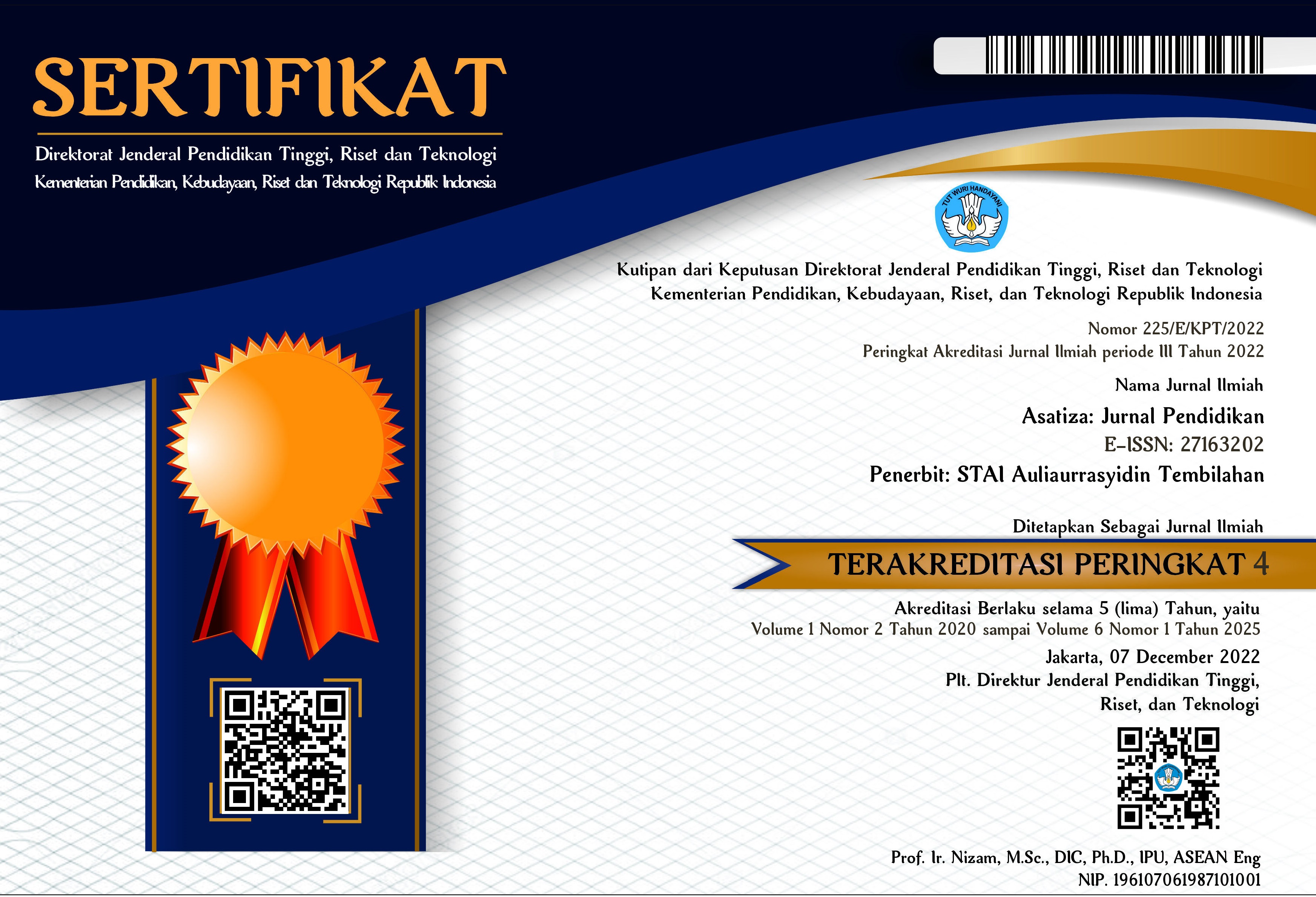Implementasi Budaya Religius dalam Upaya Meningkatkan Kecerdasan Spiritual Peserta Didik
DOI:
https://doi.org/10.46963/asatiza.v2i2.293Keywords:
Implementation, Religious Culture, Spiritual IntelligenceAbstract
This study aimed at describing how the implementation of religious culture in increasing the spiritual intelligence of participants in schools. This study used a qualitative descriptive method with the objectives being studied were students of MI Terpadu Ad-Dimyati Bandung. The data collection techniques used were interviews, observation, and documentation. The results showed that the implementation of religious culture in increasing the spiritual intelligence of students through smiling, greeting, and greeting (3S), Tausiah, reading short surahs, and Asmaul Husna, prayer zuhr in the congregation, Dhuha prayer, Istighasah, and Infaq (Gerakan Dua Bumi-The movement of Two Earths) have met the criteria for increasing the spiritual intelligence of students. Because as an Islamic educational institution, the school is not only concerned with cognitive aspects but also good habituation and spiritual concepts that can be applied in everyday life. This research is expected to broaden the writer's insight, especially and generally for readers. Whereas for schools the implementation of religious culture to improve the spiritual intelligence of students should involve the participation of families and communities so that the increase in spiritual intelligence is more optimal
Downloads
References
Arifin, Z. (2012). Pendidikan multikultural-religius untuk mewujudkan karakter peserta didik yang humanis-religius. Jurnal Pendidikan Islam, 1(1), 89-103. https://doi.org/10.14421/jpi.2011.11.89-103.
Aziz, S. (2017). Pendidikan spiritual berbasis sufistik bagi anak usia dini dalam keluarga. Jurnal Dialogia, 15(1), 131–150. DOI: https://doi.org/10.21154/dialogia.v15i1.1188.
Fathurrohman, M. (2016). Pengembangan budaya religius dalam meningkatkan mutu pendidikan. Ta’allum: Jurnal Pendidikan Islam, 4(1), 19-42. https://doi.org/10.21274/taalum.2016.4.1.19-42.
Hanyajani, A. N. (2017). Upaya Pembinaan Kecerdasan Spiritual Santri Pondok Pesantren Assalafiyah Nurul Yaqiin Kelurahan Bejen Karanganyar. IAIN Salatiga.
Hasim, F., & Nurfalah, Y. (2020). Pendidikan spiritual dalam tradisi istighosah santri Pondok Pesantren Al Mahrusiyah III Ngampel. EL Bidayah: Journal of Islamic Elementary Education, 2(2), 89-100. https://doi.org/10.33367/jiee.v2i2.1304.
Herlena, B., & Seftiani, N. A. (2018). Kecerdasan spiritual sebagai prediktor kesejahteraan subjektif pada mahasiswa. Jurnal Psikologi Integratif, 6(1), 101–115. https://doi.org/10.14421/jpsi.v6i1.1473.
Imaddudin, A. (2015). Mengembangkan kesejahteraan spiritual peserta didik sebagai katalis bangsa inovatif. Pedagogik (Jurnal Pendidikan Sekolah Dasar), 3(1), 51–61.
Kinanti, R. D., Effendi, D. I., & Mujib, A. (2019). Peranan bimbingan keagamaan dalam meningkatkan kecerdasan spiritual remaja. Irsyad : Jurnal Bimbingan, Penyuluhan, Konseling, Dan Psikoterapi Islam, 7(2), 249–270. https://doi.org/10.15575/IRSYAD.V7I2.58.
Karolina, A., Afsiska, W., Azwar, B., Cikdin, C., & Yanuarti, E. (2020). Peran orangtua penambang emas dalam menanamkan pendidikan agama Islam pada anak dikelurahan kampung jawa. Edification Journal : Pendidikan Agama Islam, 3(1), 1-22. https://doi.org/10.37092/ej.v3i1.206.
Kusuma, W. (2019). Upaya meningkatkan prestasi belajar melalui peningkatan kecerdasan spiritual santri pondok pesantren. JOEAI:Journal of Education and Instruction, 2(2), 104-111. https://doi.org/https://doi.org/10.31539/joeai.v2i2.896/
Kutisah, K., Sa'dijah, J., & Faisol. A (2019). Implementasi budaya religius di SMA Islam Nusantara Malang. Vicratina: Jurnal Pendidikan Islam, 4(2), 36–41.
Lathifah, Z. K., & Rusli, K. R. (2019). Pembiasaan spiritual untuk meningkatkan pendidikan karakter peserta didik. Jurnal Tadbir Muwahhid, 3(1), 14–26. http://dx.doi.org/10.30997/jtm.v3i1.1649.
Nadziroh, A. (2020). Strategi penguatan budaya religius dalam membentuk karakter. Religious: Jurnal Studi Agama-Agama Dan Lintas Budaya, 1(4), 64–72. https://doi.org/10.15575/rjsalb.v4i1.6432.
Rahmawati, U. (2016). Pengembangan kecerdasan spiritual santri: studi terhadap kegiatan keagamaan di Rumah TahfizQu Deresan Putri Yogyakarta. Jurnal Penelitian, 10(1). http://dx.doi.org/10.21043/jupe.v10i1.1332.
Rifa’i, M. K. (2016). Internalisasi nilai-nilai religius berbasis multikultural dalam membentuk insan KAMIL. Jurnal Pendidikan Agama Islam (Journal of Islamic Education Studies), 4(1), 116-133. https://doi.org/10.15642/jpai.2016.4.1.116-133.
Rohmah, L., Hanif, M., & Anggraheni, I. (2019). Implementasi nilai-nilai kecerdasan spiritual di Yayasan Pondok Modern Al-Rifa’ie Satu Malang. VICRATINA : Jurnal Pendidikan Islam, 4(4), 94–100.
Sabiq, Z. (2012). Kecerderdasan emosi, kecerdasan spiritual dan perilaku prososial santri Pondok Pesantren Nasyrul Ulum Pamekasan. Persona, Jurnal Psikologi Indonesia, 1(2), 53–65. https://doi.org/10.30996/persona.v1i2.21.
Sa’diah, M. (2019). Menggagas model implementasi kompetensi leadership guru PAI dalam mengembangkan budaya religius sekolah. Tawazun: Jurnal Pendidikan Islam, 12(2), 1–12. https://doi.org/10.32832/tawazun.v12i2.2682
Siswanto, H. (2019). Pentingnya pengembangan budaya religious di sekolah. Madinah: Jurnal Studi Islam, 6(1), 51-62. Retrieved from http://ejournal.iai-tabah.ac.id/index.php/madinah/article/view/312.
Suyitno. (2018). Strategi Pembentukan Budaya Religius Untuk Meningkatkan Karakter Islami di Sekolah Dasar Muhammadiyah Wirobrajan 3 Yogyakarta. Edukasi: Jurnal Pendidikan, 10(2), 191–204.
Wasito, W., & Turmudi, M. (2018). Penerapan budaya religius di SD Al Mahrusiyah. Tribakti: Jurnal Pemikiran Keislaman, 29(1), 1-22. https://doi.org/10.33367/tribakti.v29i1.560.
Yasmansyah, Y. (2019). Strategi guru PAI dalam penerapan budaya religius sekolah di SMA Negeri 3 Batusangkar. Al-Fikrah: Jurnal Manajemen Pendidikan, 6(2), 159-172. https://doi.org/10.31958/jaf.v6i1.138
Downloads
Published
Issue
Section
License
Authors who publish with this journal agree to the following terms:
1. Copyright on any article is retained by the author(s).
2. The author grants the journal, right of first publication with the work simultaneously licensed under a Creative Commons Attribution shareAlike 4.0 International License that allows others to share the work with an acknowledgment of the work’s authorship and initial publication in this journal.
3. Authors are able to enter into separate, additional contractual arrangements for the non-exclusive distribution of the journal’s published version of the work (e.g., post it to an institutional repository or publish it in a book), with an acknowledgment of its initial publication in this journal.
4. Authors are permitted and encouraged to post their work online (e.g., in institutional repositories or on their website) prior to and during the submission process, as it can lead to productive exchanges, as well as earlier and greater citation of published work.
5. The article and any associated published material is distributed under the Creative Commons Attribution-ShareAlike 4.0 International License











2.png)



